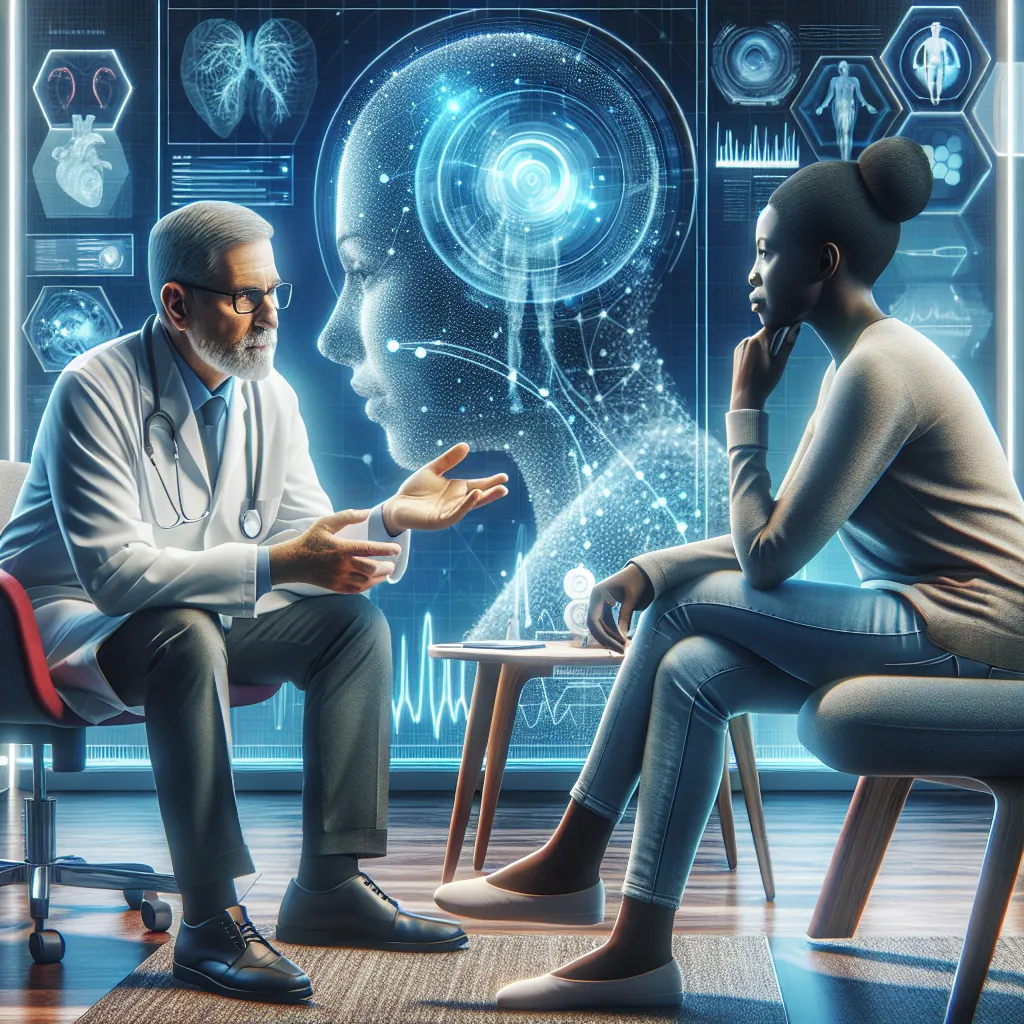Harnessing the Power of AI for Precision Diagnostics in Healthcare
Revolutionizing the healthcare industry, the integration of artificial intelligence (AI) into diagnostics is proving to be a game-changer. Harnessing the power of AI for precision diagnostics in healthcare has the potential to significantly improve patient outcomes and streamline the diagnostic process. By leveraging advanced machine learning algorithms, AI-powered diagnostics can analyze complex medical data with unprecedented speed and accuracy.
AI systems can process massive amounts of patient data, including medical images, genetic information, and clinical records, to identify patterns and anomalies that may elude human analysis. This capability enables early detection of diseases, personalized treatment recommendations, and more efficient utilization of healthcare resources.
Moreover, AI-powered diagnostics have the capacity to enhance the capabilities of healthcare professionals, providing them with valuable insights and decision support. By augmenting human expertise with AI-driven analysis, medical practitioners can make more informed decisions, leading to better patient care and outcomes.
In the near future, the widespread adoption of AI-powered diagnostics is poised to revolutionize healthcare delivery, paving the way for more precise, efficient, and personalized medical interventions.
Innovative Applications of AI in Medical Imaging and Diagnosis
Revolutionizing healthcare with AI-powered diagnostics has paved the way for innovative applications of artificial intelligence in medical imaging and diagnosis. The integration of AI in medical imaging has significantly enhanced the accuracy and speed of diagnoses, leading to improved patient outcomes and efficiency in healthcare practices.
One of the key areas where AI has shown remarkable progress is in medical imaging interpretation. AI algorithms have been developed to analyze medical images such as X-rays, MRIs, and CT scans with a level of precision that rivals, and in some cases surpasses, that of human experts. By leveraging machine learning and deep learning techniques, AI can quickly analyze vast amounts of imaging data to detect anomalies, classify diseases, and even predict patient outcomes.
Moreover, AI-powered diagnostics enable the early detection of diseases, allowing for timely intervention and treatment planning. These technologies have the potential to revolutionize screening programs for conditions like cancer, cardiovascular diseases, and neurological disorders. With AI, the identification of subtle patterns and abnormalities in medical images becomes more reliable, reducing the likelihood of misdiagnosis and missed diagnoses.
The application of AI in medical imaging and diagnosis is not only transforming the way healthcare providers deliver care but also opening new doors for personalized medicine. AI algorithms can process complex imaging data to tailor treatment plans based on individual patient characteristics, ultimately leading to more targeted and effective interventions.
In conclusion, the innovative applications of AI in medical imaging and diagnosis are reshaping the landscape of healthcare, offering unparalleled precision, efficiency, and personalized care. As AI continues to advance, its potential to revolutionize diagnostics and improve patient outcomes is truly limitless.
Revolutionizing Healthcare: AI’s Impact on Personalized Medicine
AI-powered diagnostics are revolutionizing healthcare by enabling personalized medicine that tailors treatments to individual patients. Artificial intelligence has the capability to analyze vast amounts of patient data, including genetic information, lifestyle factors, and medical history, to identify unique patterns and correlations that can guide personalized treatment plans.
The impact of AI on personalized medicine is profound, as it allows healthcare providers to move away from a one-size-fits-all approach towards targeted therapies. By harnessing the power of AI, clinicians can predict how a patient will respond to a specific treatment, thereby avoiding the trial-and-error process that often characterizes traditional medicine.
Moreover, AI algorithms can rapidly sift through complex genetic data to identify predispositions to certain diseases, allowing for early intervention and preventive measures. This proactive approach to healthcare has the potential to significantly reduce the burden of chronic illnesses and improve overall population health.
In conclusion, the integration of AI-powered diagnostics into personalized medicine marks a significant leap forward in healthcare. By leveraging the capabilities of artificial intelligence, healthcare professionals can deliver more precise, effective, and individualized care, ultimately leading to improved patient outcomes.
In conclusion, the integration of AI-powered diagnostics into personalized medicine marks a significant leap forward in healthcare. By leveraging the capabilities of artificial intelligence, healthcare professionals can deliver more precise, effective, and individualized care, ultimately leading to improved patient outcomes.
The Future of Healthcare: Integrating AI-Powered Diagnostics
The future of healthcare is being revolutionized by the integration of AI-powered diagnostics, a game-changing development that has the potential to enhance patient care, clinical efficiency, and overall health outcomes. By harnessing the power of artificial intelligence, healthcare providers are able to analyze complex medical data with unprecedented speed and accuracy, leading to earlier detection of diseases, personalized treatment strategies, and improved patient outcomes.
AI-powered diagnostics have the capability to process vast amounts of patient data, including medical images, genetic information, and clinical records, to identify patterns, predict potential health risks, and suggest tailored treatment plans. This transformative technology enables healthcare professionals to make more informed decisions, ultimately leading to more precise diagnoses and targeted interventions.
Furthermore, the integration of AI-powered diagnostics streamlines the healthcare process, reducing the time and resources required for diagnosis and treatment. This can result in significant cost savings for healthcare systems, as well as improved accessibility to timely and accurate healthcare services for patients.
As AI continues to advance, the potential for further innovation in healthcare is immense. With the ability to continuously learn and improve from new data, AI-powered diagnostics hold the promise of evolving healthcare into a more proactive, personalized, and effective system. The future integration of AI in healthcare represents a transformative shift towards a more efficient, data-driven, and patient-centric approach to diagnosis and treatment.
AI-Driven Diagnostic Tools: Transforming Healthcare Delivery
The arrival of AI-driven diagnostic tools has brought about a profound transformation in healthcare delivery. These advanced technologies are revolutionizing the way medical conditions are identified and treated, offering unprecedented accuracy and efficiency. Through sophisticated algorithms and machine learning capabilities, AI-powered diagnostic tools can rapidly analyze vast amounts of patient data, including medical images, test results, and genetic information. This enables healthcare providers to make more precise diagnoses, leading to earlier interventions and improved patient outcomes.
Moreover, AI-driven diagnostic tools are streamlining the healthcare delivery process, reducing the burden on overworked medical professionals and enhancing the overall quality of care. By automating routine tasks such as pattern recognition and data analysis, these tools empower physicians to focus their expertise on complex cases and personalized treatment strategies. As a result, healthcare organizations can optimize resource allocation, minimize diagnostic errors, and ultimately deliver more effective and cost-efficient care to a larger population.
The integration of AI-powered diagnostic tools into the healthcare ecosystem holds great promise for the future, offering a pathway to more personalized and evidence-based medicine. With continued advancements in AI technology and increasing collaboration between healthcare providers and tech innovators, the potential for further transformation in healthcare delivery is boundless. As these AI-driven tools continue to evolve, the prospect of early detection, targeted therapies, and improved patient management becomes increasingly achievable, ultimately reshaping the landscape of healthcare as we know it.



